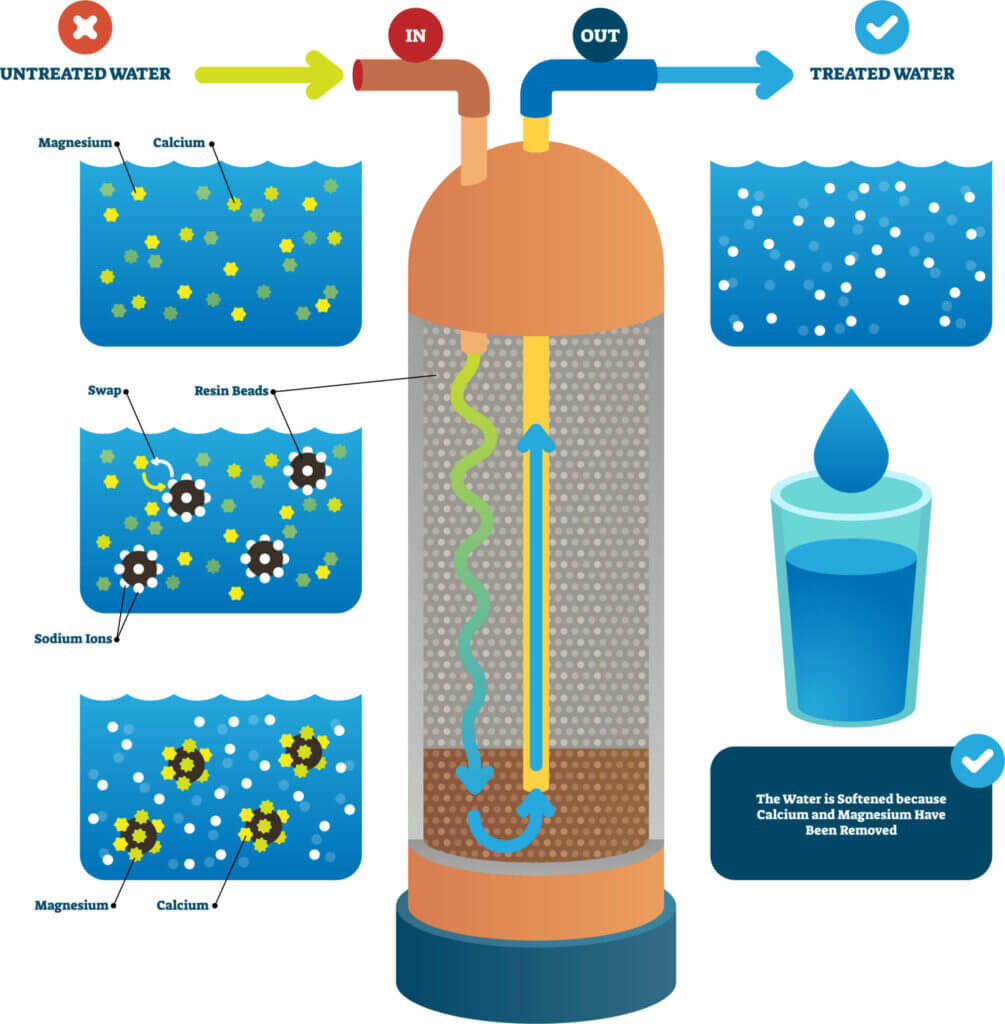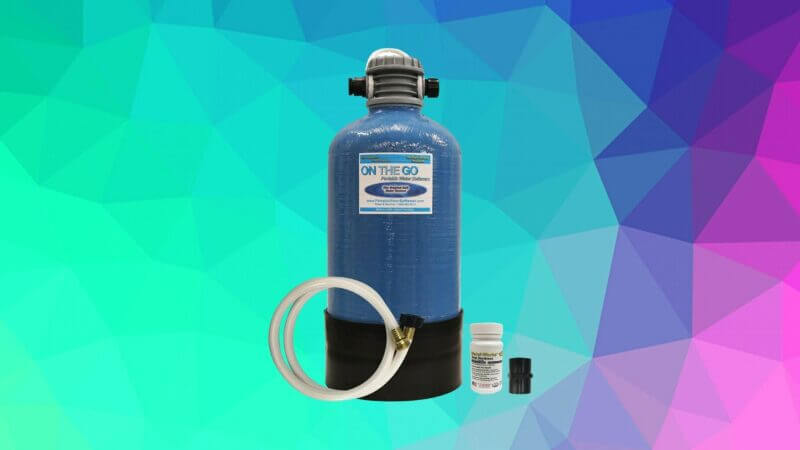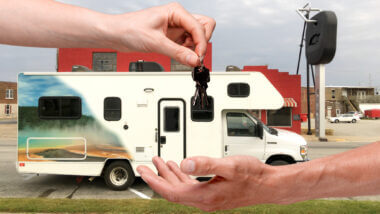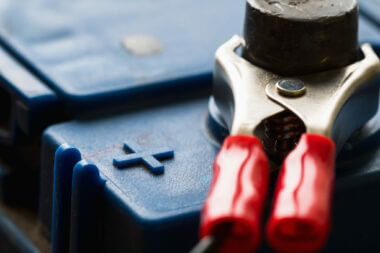Table of Contents Show
If you have ever struggled with a mineral build-up in your RV shower head or noticed rust stains in the sink or toilet, it might be time to consider installing a portable RV water softener in your rig. It’s an easy and relatively inexpensive way to improve your vehicle’s water system and lengthen the life of water-using appliances.
What is an RV Water Softener?
When traveling the country, it’s not unusual to tap into several water systems with an overabundance of minerals in them.
These minerals leach from the water and coat the interior of metal pipes, faucets, and water heaters. Water with high metal content also deposits annoying rust stains.
Many campers note a rotten egg smell from their water, as well. Most of these ailments are caused by high magnesium and calcium levels found in groundwater that has percolated, mainly through limestone bedrock.
An RV water softener attaches to your water system at the hookup outside of your rig, just like an inline water filter. The softener casing houses resin, which is attracted to the magnesium and calcium usually found in hard water. When hard water flows through the water softener apparatus, the magnesium and calcium cling to the resin, and sodium chloride is released in the water as it moves out of the water softener and into your RV. This process is known as “ion exchange.”
After some time (dependent upon your water softener), the resin becomes bound with the magnesium and calcium and cannot collect any more. That is when the water softener “regenerates” by releasing saltwater from its internal brine tank to wash the resin free of its clinging magnesium and calcium particles. In many RV water softeners, the regeneration process is done by adding salt to the unit manually, as some are not equipped with a brine tank.

What Do Grains Mean?
When referring to water softeners, a grain is how the hardness of water is measured. This figure is usually used in conjunction with liquid measurements, as in “grain per gallon of water.”
One grain equals 1/7000th of a pound of dissolved calcium and magnesium. When researching water softeners, one that is rated at 16,000 grain will be able to remove 16,000 grains of hardness before it requires regeneration.
Keep in mind, however, that those ratings come from testing done in laboratories under near-perfect conditions. So expect a 32,000-grain water softener to take out about 29,000 to 30,000 grains of hardness.
There are many water hardness testing kits on the market to see if a water softener is needed. Many softeners come with testing kits to indicate when regeneration is required.
- ✅ EASY TO READ COLOR CHART - From red to green, the large color chart makes distinguishing your test results...
- ✅ QUICK AND ACCURATE - Save time and get the test results within seconds. No need to visit a hardware store or wait...

Benefits of Using an RV Water Softener
An RV water softener can be an imperative tool to have. It can not only improve the smell and taste of your water but can keep mineral buildup in your pipes and appliances at a minimum. You won’t fight rust stains in the sink or toilet bowl, and there will be fewer deposits on showerheads and faucets, as well.
You will also notice that soap lathers much better when using soft water because the minerals found in hard water are gone. The water is much purer without them. And those minerals are no longer deposited on your skin and hair when taking a shower – another great benefit of this nifty little tool!
What To Look For in an RV Water Softener
Value
If you spend a good portion of your time regenerating the RV water softener because it is undersized, you may want to invest in a larger unit.
Value can be accessed not only by price but by the quality and convenience it offers. Try a softener of 16,000 grains or more, and you may not have to regenerate it for three months or longer.
Physical Size
Portable water softening units for RVs are usually pretty small in size. Often measuring no taller than two feet, with a diameter of 10 to 12 inches. The size might be more critical when they are not in use because of the need for storage space as you travel.
Capacity
Use the capacity or grain count as the determining factor in purchasing an RV water softener. They usually come in 8,000-grain increments like 8,000 grain, 16,000 grain, 24,000 grain, etc.
The Best RV Water Softener: On The Go Portable RV Water Softener
This 16,000-grain water softener is perfect for an RV. It is compact, making it easy to store when not in use. The On The Go Portable Water Softener provides up to 1,600 gallons of soft water before needing regeneration. Regeneration can be done in 30 minutes with ordinary table salt!
- The Double Standard Softener & Conditioner produces twice the gallons compared to the standard model and is the largest...
- Built for the owner of any RV/Marine model, this 16,000 grain unit is a perfect fit and supplies approx. 40% more soft...
Don’t Take Our Word For It – Here’s What Other People Are Saying
An Amazon customer said, “Love it!! Bought this for our winter stay in an RV Park in Florida. The water here is very hard, so I thought this would be worth a try. Well, installed it, and what a difference!! Our water hardness was 180 and is still at zero (0) after three weeks of use.”
Mike states, “When I tested the water at our seasonal campground, the hardness was off the scale, extremely hard. Installed this softener and after 25 days of use, including two people showering I still have not had to regenerate. Taps, toilets and sinks stay much much cleaner. A lot less soap required for dishes and showering. The bottom line is this softener works fantastic!”
Conclusion
RV water system essentials are sometimes overlooked. That is until rust stains start showing up or a family member notices a foul smell from the faucet. That’s when the need for an RV water softener becomes apparent. Once installed, you will begin to wonder why this tool wasn’t mandatory from the very beginning, as it will make camp life a lot more enjoyable!
Last update on 2024-07-26 / Affiliate links / Images from Amazon Product Advertising API








